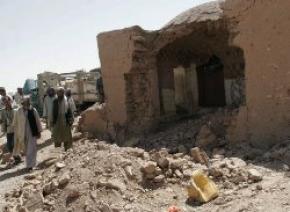ID :
92495
Tue, 12/01/2009 - 13:38
Auther :
Shortlink :
http://m.oananews.org//node/92495
The shortlink copeid
Western aid used for Afghan war, not to fight poverty : Report

London, Nov 30, IRNA – Western aid in Afghanistan is being used primarily for so-called war on terrorism rather relieving poverty and suffering in the country, according to a new report from the London School of Economics and Political Science (LSE).
The report, Manufacturing Civil Society and the Limits of Legitimacy, finds that aid poured into Afghanistan since the overthrow of the Taliban regime is currently estimated to be $ 2.3 billion a year.
“Although aid policy has not been wholly subordinated to security objectives, the allocation of a disproportionate amount of aid to southern parts of Afghanistan where insurgency is rife suggests that poverty reduction is not the primary criterion being used,” it said.
“As throughout Afghanistan’s recent history, foreign aid has been used to leverage external security interests, which, since 2001, have centred on fighting elements of Al-Qaeda as well as a resurgent Taliban,” said the report, drawn on fieldwork over the past 4 years.
One of the authors, Professor Jude Howell, said it is now widely observed that much of the aid is being used to “tackle the increasingly violent insurgency in southern Afghanistan, rather than being targeted at areas where humanitarian needs are most acute.’
The research, published in the latest edition of the European Journal of Development Research, found that increasing volumes of aid has been channelled by western countries through Afghan government controlled programmes leading to a mushroom of NGOs since 2001.
“Many NGOs have been reluctant to critically evaluate their own principled stance and recognize the political contradictions of their own positions in a deeply politicized and shifting political contest,” it said.
The authors call on aid agencies and other NGOs to “examine more closely how they are being manipulated by the War on Terror.”
“Afghanistan shows well the need for NGOs to reflect more deeply on their own positions in the highly charged situations in which they intervene, and where neutrality may be nothing more than illusory,’ their report concluded.
The research by Howell and her colleague Jeremy Lind is also in their two new books on Civil Society Under Strain. Counter-Terrorism Policy, Civil Society and Aid Post-9/11, due to be published in January, and Counter-Terrorism, Aid and Civil Society./end
The report, Manufacturing Civil Society and the Limits of Legitimacy, finds that aid poured into Afghanistan since the overthrow of the Taliban regime is currently estimated to be $ 2.3 billion a year.
“Although aid policy has not been wholly subordinated to security objectives, the allocation of a disproportionate amount of aid to southern parts of Afghanistan where insurgency is rife suggests that poverty reduction is not the primary criterion being used,” it said.
“As throughout Afghanistan’s recent history, foreign aid has been used to leverage external security interests, which, since 2001, have centred on fighting elements of Al-Qaeda as well as a resurgent Taliban,” said the report, drawn on fieldwork over the past 4 years.
One of the authors, Professor Jude Howell, said it is now widely observed that much of the aid is being used to “tackle the increasingly violent insurgency in southern Afghanistan, rather than being targeted at areas where humanitarian needs are most acute.’
The research, published in the latest edition of the European Journal of Development Research, found that increasing volumes of aid has been channelled by western countries through Afghan government controlled programmes leading to a mushroom of NGOs since 2001.
“Many NGOs have been reluctant to critically evaluate their own principled stance and recognize the political contradictions of their own positions in a deeply politicized and shifting political contest,” it said.
The authors call on aid agencies and other NGOs to “examine more closely how they are being manipulated by the War on Terror.”
“Afghanistan shows well the need for NGOs to reflect more deeply on their own positions in the highly charged situations in which they intervene, and where neutrality may be nothing more than illusory,’ their report concluded.
The research by Howell and her colleague Jeremy Lind is also in their two new books on Civil Society Under Strain. Counter-Terrorism Policy, Civil Society and Aid Post-9/11, due to be published in January, and Counter-Terrorism, Aid and Civil Society./end





